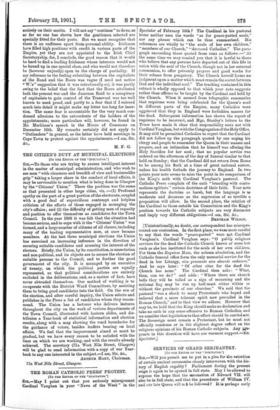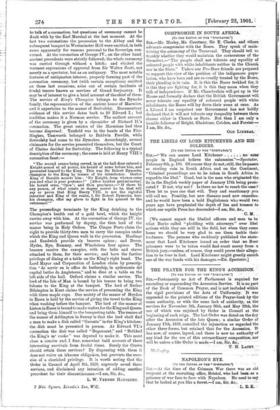SERVICES OF GRAND SERJEANTRY.
[TO THE EDITOR OP THE "SPECTATOR:1
you permit me to put in a plea for the retention of certain ancient ceremonies closely interwoven with the his- tory of English regality ? Parliament during the present reign is again to be opened in full state. May I be allowed to express the hope that the coronation of Edward vu. will also be in full state, and that the precedents of William IV. and our late Queen will nct be followed? It is perhaps early
to talk of a coronation, but questions of ceremony cannot be dealt with by the Earl Marshal at the last moment. At the last two coronations the procession to the Abbey and the subsequent banquet in Westminster Hall were omitted, in both cases apparently for reasons personal to the Sovereign con- cerned. At the coronation of George IV., on the other hand, ancient precedents were strictly followed; the whole ceremony was carried through without a hitch; and elicited the warmest expressions of approval from Sir Walter Scott, not merely as a spectator, but as an antiquary. The most notable features of antiquarian interest, properly forming part of the coronation ceremony, but (with certain exceptions) omitted on these last occasions, arise out of certain incidents of feudal tenure known as services of Grand Serjeantry. It may be of interest to give a brief account of the chief of them.
The service of King's Champion belongs to the Dymoke family, the representatives of the ancient house of Marmion,
and it appertains to the manor of Scrivelsby. Documentary evidence of this service dates back to 20 Edward I.; but tradition makes it a Norman service. The earliest account of the ceremony is given by a chronicler of Richard IL's coronation. The great estates of the Marmions had then become dispersed. Tanfield was in the hands of the Fitz- Hughes, Tamworth belonged to Baldwin Freville, while Scrivelsby had come to the Dymokes. Accordingly, several claimants for the service presented themselves, but the Court of Claims decided for Scrivelsby. The following is a typical description of the ceremony; the scene is laid at Henry VILL's coronation feast:— 'The second course being served, in at the hall door entered a Knight armed at all points, his herald of arms before him, and presented himself to the King. This was Sir Robert Dyroocke, champion to the King by tenure of his inheritance. Garter King of Heralds accosts him : Sir Knight, from whence come you and what is your pretence ? ' [After further preliminaries] his herald cries,Oyes ' • and then proclaims := If there be any person, of what estate or degree soever he be, that will say or prove that King Henry VIII. is not the rightful inheritor and King of the realm, I, Sir Robert Dymocke, here his champion, offer my glove to fight in his quarrel to the ontraunce.' "
The proceedings terminate by the King drinking to the Champion's health out of a gold bowl, which the knight carries away with him. At the coronation of George IV. the service was performed by deputy, the then lord of the manor being in Holy Orders. The Cinque Ports claim the right to provide thirty-two men to carry the canopies under which the King and Queen walk in the procession. Hastings and Sandwich provide six bearers apiece ; and Dover, Hythe, Rye, Romney, and Winchelsea four apiece. The bearers receive the canopies, with the bells and staves attached to them, for their service; and have the further privilege of dining at a table on the King's right hand. The Lord Mayor and Corporation of London claim by prescrip- tion "de servir en le office de butlership, in aydements del capital butler de Angleterre," and to dine at a table on the left side of the hall. Oxford claims a similar service. The lord of the Isle of Man is bound by his tenure to bring two falcons to the King at the banquet. The lord of Nether Bilsington in Kent claims the service of presenting the King with three maple cups. One moiety of the manor of Heydon in Essex is held by the service of giving the towel to the King when washing before the banquet. The lord of the manor of Liston in Essex is bound to make wafers for the King and Queen, and bring them himself to the banqueting table. The tenure of the manor of Addington in Surrey is that the lord shall find a man to make a dish called " Geronts" in the King's kitchen: the dish must be presented in person. At Edward VI.'s coronation the dish was called "Degerount," and " Brikked
the King's cooke " was deputed to make it. This must close a concise and, I fear, somewhat bald account of these interesting survivals from feudal times. Surely the Crown should retain these services ? By dispensing with them it does not waive an irksome obligation, but prevents the exer- cise of a cherished privilege. It is worth noting that the Order in Council of April 8th, 1838, expressly saved these services, and disclaimed any intention of adding another precedent for their discontinuance.—I am, Sir, &c.,
L. W. VERNON HA.ECOURT.
7 Neit. Square, Lincoln'sInn, W.C.







































 Previous page
Previous page